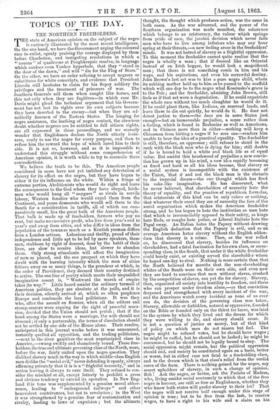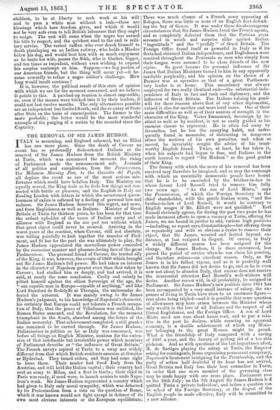TOPICS OF THE DAY.
THE NORTHERN FREEHOLDERS. THE state of American opinion on the subject of the negro is curiously illustrated by the most recent intelligence. On the one hand, we have the Government urging the coloured race to enlist, openly praising the courage displayed by them before Charleston, and instigating resolutions in which a " caucus " of quadroons at Poughkeepsie resolve, in language which outdoes even Yankee hyperbole, that they " stand in the door of the dawn," and will "die for the Flag of Stars." On the other, we have an order refusing to accept negroes as substitutes for white conscripts, and evidence that President Lincoln still hesitates to claim for his Sepoy soldiery the privileges and the treatment of prisoners of war. The Southern Generals sell them when caught like horses, and this not only when they are fugitives—in which case Mr. Davis might plead the technical argument that his Govern- ment has not lost its rights over its own subjects because they have deserted to the enemy—but when they are ad- mittedly freemen of the Eastern States. The longing for negro assistance, the loathing of negro contact, the atrocious doubt whether negroes can be entitled to full citizen rights, are all expressed in these proceedings, and we scarcely wonder that Englishmen declare the North utterly insin- cere, ready to use the negro for every purpose, and then to refuse him the reward the hope of which lured him to their side. It is not so, however, and as it is impossible to understand this struggle without some comprehension of American opinion, it is worth while to try to reconcile these contradictions.
We believe the truth to be this. The American people considered in mass have not yet imbibed any detestation of slavery for its effect on the negro, but they have begun to abhor it for its influence on the white. Within a fringe of extreme parties, Abolitionists who would do right and leave the consequences to the God whom they have obeyed, Irish- men who would hang all " naygurs " as rivals in servile labour, Western fanatics who would expel them from the Continent, and peace democrats who would sell them to the South for a consideration in tariffs, all of which are com- paratively small, lies the great bulk of the American people. That bulk is made up of freeholders, farmers who pay no rent, but make no excessive profit, who live from year's end to Tear's end away from cities, and who differ in ideas from the population of the towns as much as a Kentish yeoman differs from a London artizan. Laborious and thrifty, proud of their independence and little apt to be led by mere speakers, these men, stubborn by right of descent, dour by the habit of their lives, are slow to receive ideas, but slower to abandon them. Only strong stimulants will affect the imagination of men so placed, and the one prospect on which they have dwelt with the burning intensity which the man of cities fritters away on so many things, is the grandeur at which, in the order of Providence, they deemed their country destined to arrive. The one line of poetry which meets their unqualified imaginative assent is, "Westward the march of empire takes its way." Little heard amidst the ordinary turmoil of American politics, they are absolute at the polls, and it is their decision, silently arrived at, which so often perplexes Europe and confounds the local politicians. It was they who, after the assault on Sumter, when all the editors and stump-orators were arguing for the right of peaceful seces- sion, decided that the Union should not perish ; that if the bond among the States were a marriage, the wife should not abscond ; if only a partnership, the terms of dissolution should not be settled by one side of the House alone. Their resolve, anticipated in this journal weeks before it was announced, instantly quelled all opposition, and the trading politicians, —next to the river gamblers the most unprincipled class in America,—swung swiftly and shamelessly round. These free- holders, the true and ultimate governing class of the North, were, before the war, fairly united upon the negro question. They disliked slavery much in the way in which middle-class English men dislike the "social evil," never defending it openly, always affirming privately that it is is a " frightful necessity," and in action leaving it always to cure itself. They refused to con- sider the mischief at all, except latterly to prohibit a gross and obvious tendency to extend its operation. In New Eng- land this tone was supplemented by a genuine moral abhor- rence, leading to " underground railways" and other benevolent contrivances, but not to revolution ; in the West it was strengthened by a genuine fear of contamination and rivalry, leading to laws of expulsion ; but the ultimate thought, the thought which produces action, was the same in both cases. As the war advanced, and the power of the Southern organization was made manifest, the coherence which belongs to an aristocracy, the valour which springs. from pride of race, the jacobin decision which never fails men who have to live among inferiors who may any hour spring at their throats,—a new feeling arose in the freeholders' minds. It was not hatred of slavery as a frightful oppression.. To this moment the freeholder cannot quite realize that the negro is wholly a man ; that if dressed like an Oriental instead of an Irish beggar, he would look a magnificent man ; that there is not something comic in him and his ways, and his aspirations, and even his sorrowful destiny. John Brown's last act was to kiss a pure negro child, whom its sobbing mother held up to him as he passed to the scaffold which will one day be to the negro what Kosciusko's grave is- to the Pole; and the freeholder, admiring John Brown, still. feels as if that act were a degradation. If he could expatriate the whole race without too much slaughter he would do it. If he could plant them, like Indians, on reserved lands, and leave them to die out quietly, he would do it. He does not detest justice to them—the laws are in some States just enough—but an immoveable prejudice, a sense rather than a feeling, which is found in Brahmins as well as Americans, and in Chinese more than in either—nothing will keep a Chinaman from hitting a negro if he sees one—renders him unable to bear the idea of a practical equality. The freeholder- is still, therefore, an oppressor ; still refuses to stand in the- rank with the black man who is dying for him ; still doubts- if he is bound to hold a white and black life as of equal value. But amidst this brnshwood of prejudice a new convic- tion has grown up in his mind, a new idea rapidly becoming- as fixed and hard as all his ideas become, that slavery as a social system is incompatible with the existence of the Union, that it and not the black man is the obstacle to the imperial dream—the one thought which has fired.
his coke-like imagination. He has discovered, what ho never believed, that slaveholders of necessity hate the- theory of equality, and the practice of republican formulas,. that aristocrats of this kind can be only rulers or nothing,. that whatever their creed they are of necessity the foes of the social organization which makes the American freeholder- strong, and he has begun to hate the institution as men hate- that which is irreconcilably opposed to their safety, as kings hate Reds, or roughs hate police, or Liberal Italians hate the- Papal sway. An Italian hates the Papacy without drawing the English deduction that the Papacy is evil, and so an average American hates slavery without the English adden- dum that slavery is a crime. Then, as the war rolled on, he discovered that slavery, besides its influence on slaveholders, had a fatal fascination for his own class, or corre- sponding class, in the South, that under it the white freeholder- could barely exist, or existing served the slaveholder whom he hoped one day to rival. Nothing is more certain than that the North believed for months that the non-slareholding- whites of the South were on their own side, and even now they are hard to convince that men without slaves, crushed by the competition of slaves, can yet die for slavery. Slavery, then, organized all society into hostility to freedom, and those who can prosper under freedom alone,—as that conviction deepened and strengthened with every incident of the war, and the Americans watch every incident as none of us ever can do, the decision of the governing class was taken.. Slavery, allowable or forbidden, natural or oppressive, founded on the Bible or founded only on the thirst for lucre, was fatal to the system by which they lived and the dream for whicls they were willing to die, and slavery should cease. It. is not a question of justice or mercy, but of that kind of policy on which men do not reason but feel. The negro might be refused votes, but he should have wages ; he might be cuffed, but he should not be lashed; he might be contemned, but he should not be legally bound to obey. The- social oppression might remain, but the political oppression should end, and society be constituted again on a basis, better or worse, but in either case not fatal to a freeholdmg class, and to the dream which is that class's relief from the sordid cares of the farm. There is nothing gained for the negro, say secret upholders of slavery, in such a change of opinion. Bah Ask the negro, or better, ask the Pariahs of Madras, who, living amidst social contumely to which that of the free negro is honour, are still as free as Englishmen, whether they who /mow both states will prefer slavery to their lot? That the negro will not receive half enough under this stage of opinion is true; but to be free from the lash, to receive wages, to have a right to his wife and a claim on his children, to be at liberty to seek work at his will and to pass a white man without a lash—these are blessings which bare freedom gives, and which it would not be very safe even to tell British labourers that they ought to resign. The rest will come when the negro has earned his title to respect, and the quickest road to the end is mili- tary service. The veriest ruffian who ever drank himself to death platelaying on an Indian railway, who holds a Hindoo below his dog, and would beat him with as much enjoyment as he beats his wife, passes the Sikh, who is blacker, bigger, and ten times as impudent, without even wishing to expend his surplus contempt on him. Suppose—we beg pardon of our American friends, but the thing will occur yet—it be- came cowardly to refuse a negro soldier's challenge. How long would insult continue ?
It is, however, the political result of this state of opinion with which we are for the moment concerned, and we believe it points to this. A patched-up reunion is almost impossible, or, even if the masses were tricked into it by their leaders, it could not last twelve months. The only alternatives possible are an independent but limited South, and the re-entry of State after State on the basis of emancipation. The former is the more probable ; the latter would be the most wonderful example of the purging of a nation by fire recorded since the Captivity.































 Previous page
Previous page